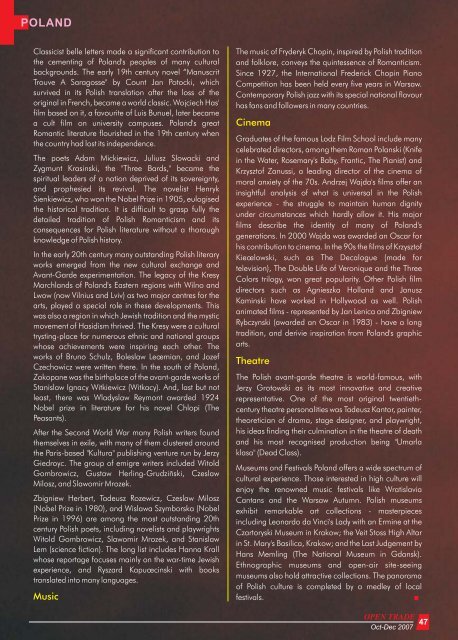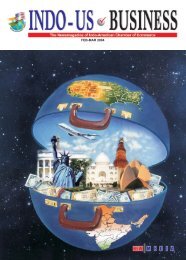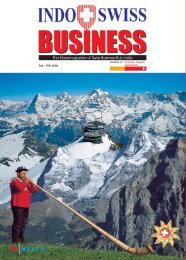pele SciaSction - new media
pele SciaSction - new media
pele SciaSction - new media
You also want an ePaper? Increase the reach of your titles
YUMPU automatically turns print PDFs into web optimized ePapers that Google loves.
POLAND<br />
Classicist belle letters made a significant contribution to The music of Fryderyk Chopin, inspired by Polish tradition<br />
the cementing of Poland's peoples of many cultural and folklore, conveys the quintessence of Romanticism.<br />
backgrounds. The early 19th century novel “ Manuscrit Since 1927, the International Frederick Chopin Piano<br />
Trouve A Saragosse" by Count Jan Potocki, which Competition has been held every five years in Warsaw.<br />
survived in its Polish translation after the loss of the Contemporary Polish jazz with its special national flavour<br />
original in French, became a world classic. Wojciech Has' has fans and followers in many countries.<br />
film based on it, a favourite of Luis Bunuel, later became<br />
a cult film on university campuses. Poland's great Cinema<br />
Romantic literature flourished in the 19th century when<br />
Graduates of the famous Lodz Film School include many<br />
the country had lost its independence.<br />
celebrated directors, among them Roman Polanski (Knife<br />
The poets Adam Mickiewicz, Juliusz Slowacki and in the Water, Rosemary's Baby, Frantic, The Pianist) and<br />
Zygmunt Krasinski, the "Three Bards," became the Krzysztof Zanussi, a leading director of the cinema of<br />
spiritual leaders of a nation deprived of its sovereignty,<br />
moral anxiety of the 70s. Andrzej Wajda's films offer an<br />
and prophesied its revival. The novelist Henryk<br />
insightful analysis of what is universal in the Polish<br />
Sienkiewicz, who won the Nobel Prize in 1905, eulogised<br />
experience - the struggle to maintain human dignity<br />
the historical tradition. It is difficult to grasp fully the<br />
under circumstances which hardly allow it. His major<br />
detailed tradition of Polish Romanticism and its<br />
films describe the identity of many of Poland's<br />
consequences for Polish literature without a thorough<br />
knowledge of Polish history.<br />
generations. In 2000 Wajda was awarded an Oscar for<br />
his contribution to cinema. In the 90s the films of Krzysztof<br />
In the early 20th century many outstanding Polish literary Kieœlowski, such as The Decalogue (made for<br />
works emerged from the <strong>new</strong> cultural exchange and<br />
television), The Double Life of Veronique and the Three<br />
Avant-Garde experimentation. The legacy of the Kresy<br />
Colors trilogy, won great popularity. Other Polish film<br />
Marchlands of Poland's Eastern regions with Wilno and<br />
directors such as Agnieszka Holland and Janusz<br />
Lwow (now Vilnius and Lviv) as two major centres for the<br />
Kaminski have worked in Hollywood as well. Polish<br />
arts, played a special role in these developments. This<br />
animated films - represented by Jan Lenica and Zbigniew<br />
was also a region in which Jewish tradition and the mystic<br />
movement of Hasidism thrived. The Kresy were a cultural<br />
Rybczynski (awarded an Oscar in 1983) - have a long<br />
trysting-place for numerous ethnic and national groups tradition, and derivie inspiration from Poland's graphic<br />
whose achievements were inspiring each other. The arts.<br />
works of Bruno Schulz, Boleslaw Leœmian, and Jozef<br />
Czechowicz were written there. In the south of Poland,<br />
Theatre<br />
Zakopane was the birthplace of the avant-garde works of The Polish avant-garde theatre is world-famous, with<br />
Stanislaw Ignacy Witkiewicz (Witkacy). And, last but not Jerzy Grotowski as its most innovative and creative<br />
least, there was Wladyslaw Reymont awarded 1924 representative. One of the most original twentieth-<br />
Nobel prize in literature for his novel Chlopi (The century theatre personalities was Tadeusz Kantor, painter,<br />
Peasants).<br />
theoretician of drama, stage designer, and playwright,<br />
After the Second World War many Polish writers found his ideas finding their culmination in the theatre of death<br />
themselves in exile, with many of them clustered around and his most recognised production being "Umarla<br />
the Paris-based "Kultura" publishing venture run by Jerzy klasa" (Dead Class).<br />
Giedroyc. The group of emigre writers included Witold<br />
Museums and Festivals Poland offers a wide spectrum of<br />
Gombrowicz, Gustaw Herling-Grudziñski, Czeslaw<br />
cultural experience. Those interested in high culture will<br />
Milosz, and Slawomir Mrozek.<br />
enjoy the renowned music festivals like Wratislavia<br />
Zbigniew Herbert, Tadeusz Rozewicz, Czeslaw Milosz Cantans and the Warsaw Autumn. Polish museums<br />
(Nobel Prize in 1980), and Wislawa Szymborska (Nobel exhibit remarkable art collections - masterpieces<br />
Prize in 1996) are among the most outstanding 20th including Leonardo da Vinci's Lady with an Ermine at the<br />
century Polish poets, including novelists and playwrights<br />
Czartoryski Museum in Krakow; the Veit Stoss High Altar<br />
Witold Gombrowicz, Slawomir Mrozek, and Stanislaw<br />
in St. Mary's Basilica, Krakow; and the Last Judgement by<br />
Lem (science fiction). The long list includes Hanna Krall<br />
Hans Memling (The National Museum in Gdansk).<br />
whose reportage focuses mainly on the war-time Jewish<br />
Ethnographic museums and open-air site-seeing<br />
experience, and Ryszard Kapuœcinski with books<br />
museums also hold attractive collections. The panorama<br />
translated into many languages.<br />
of Polish culture is completed by a medley of local<br />
Music<br />
festivals.<br />
<br />
OPEN TRADE 47<br />
Oct-Dec 2007

















